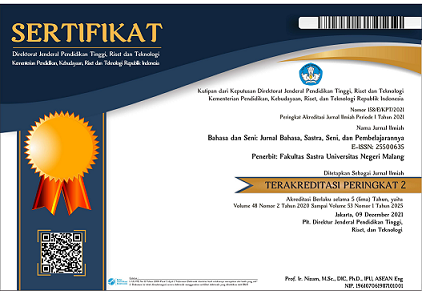THE LEARNING EXPERIENCES OF FOREIGN LANGUAGE STUDENTS IN A CULTURE TRIP
Abstract
This study examined the learning experiences of students of English as a Foreign Language in a culture trip that was conducted within the students' own multicultural society (Indonesia). The culture trip was aimed at providing the students with hands-on experience to learn about cross-cultural adjustment, skills to relate to people of other cultures, to be independent, and to act responsibly. Those skills are parts of the skills that people need to perform in the 21 st century environments. The study was guided by a research question: what were the students' learning experiences during the culture trip? The qualitative data for answering the research question were collected from the students' individual written reports of the trip, and the results of open-ended questionnaires given after the trip. The findings showed that for many of the students, the trip was their first independent travel experience which provided not only cross-cultural adjustment learning experience but also learning lessons about many of the skills needed in the 21 st century such as communication, using information technology, being self-directed, independent and responsible, managing goals and time, collaboration and working in a team. The study may be useful for teachers of language who would like to provide cross-cultural experiences and soft skills to the students to function effectively in 21st-century environments.
Keywords: authentic learning activities; cross-cultural adjustment; 21st century skills
Full Text:
PDFReferences
Beil, E., & Mayor, D.G. 2018. The Challenge of Cross-Cultural Adjustment. Master’s Thesis. Department of Management and Engineering, Linkoping University.
Craven, J., & Griffiths, J. R. 2011. Data Analysis. In Grant, M. J., Sen, B., & Spring, H. (Eds.), Research Evaluation and Audit : Key Steps in Demonstrating Your Value (pp.145-175). Retrieved from http://ebookcentral.proquest.com Created from uksw-ebooks on 2018-12-17 23:45:01
Cretu, D. 2017. Fostering 21st Century Skills for Future Teachers. Edu World 2016, 7Th International Conference paper. http://dx.doi.org/10.15405/epsbs.2017.05.02.8
DeLong, M., et al. 2009. Cultural Exchange: Evaluating an Alternative Model in Higher Education. Journal of Studies in International Education 20 (10) 1-17. doi:10.1177/1028315309334619
Diamond, S., Middleton, A., & Mather, R. 2011. A Cross-Faculty Simulation Model for Authentic Learning. Innovations in Education and Teaching International, 48(1), 25–35.
Fitzsimmons, P., & Lanphar, E. 2011. When there’s Love inside there’s a Reason Why: Emotion as the Core of Authentic Learning in One Middle School Classroom. Literacy Learning in the Middle Years, 19(2), 35-40.
Greene, J. P., Kisida, B., & Bowen, D. H. 2014. The Educational Value of Field Trips. Education Next 14 (1), 78-86
Han, H., Hawken, S. 2018. Introduction: Innovation and Identity in Next-generation smart Cities. City, Culture and Society 12, 1-4
Heath, S. B., & McLaughlin, M. W. 1994. Learning for anything every day. Journal of Curriculum Studies, 26(5), 471–489. Doi: 10.1080/0022027940260501.
KOÇYİĞİTa, S., Zembat, R. 2013. The Effects of Authentic Tasks on Preservice Teachers’ Attitudes towards Classes and Problem Solving Skills. Educational Sciences: Theory & Practice 13(2), 1045-1051.
Kreber, C., Klampfleitner, M., McCune, V., Bayne, S., & Knottenbelt, M. 2007. What Do You Mean by ‘‘Authentic’’? A Comparative Review of the Literature on Conceptions of Authenticity in Teaching. Adult Education Quarterly, American Association for Adult and Continuing Education, 58(1), 22–43.
Li, Y.X & Sano, H. 2013. Cross-Cultural Adjustment of Chinese Students in Japan: School Adjustment and Educational Support. International Journal of Progressive Education 9 (3) 154-168
Lombardi, M.M. 2007. Authentic learning for the 21st century: An overview. Retrieved September 25, 2018, from https://www.researchgate.net/publication/220040581_ Authentic_Learning_for_the_21st_Century
Ozverir, I., Osam, U. V., & Herrington, J. 2017. Investigating the effects of authentic Activities on foreign language learning: A design-based research approach. Educational Technology & Society, 20(4), 261–274.
Partnership for 21st Century Skills. 2010. 21st Century Knowledge and Skills in Educator Preparation. Retrieved from http://www.p21.org/storage/documents/ aacte_p21_whitepaper2010.pdf
Roberson, D. N., Jr. 2003. Learning experiences of senior travelers. Studies in Continuing Education, 21(1), 125–144. https://doi.org/10.1080/01580370309288
Rule, A.C. 2006. Editorial: The components of authentic learning. Journal of Authentic Learning, 3(1), 1-10. Salatiga
Population 2019 http://www.citypopulation.info/php/ indonesia-admin.php?adm2id=3373 Scavenger Hunt Ideas: https://id.pinterest.com/ cat6745/scavenger-hunt-ideas/)
Schank, R. C., Fano, A., Bell, B., & Jona, M. 1994. The Design of Goal-Based Scenarios. Journal of the Learning Sciences, 3(4), 305–345. Doi: 10.1207/s15327809jls0304_2
Sinanu, F. 2017. Language, Culture, and Identity (Course Pack). Salatiga: English Language Education Program, Universitas Kristen Satya Wacana. Surabaya Population 2019 retrieved 31 January 2019 from http://worldpopulationreview.com/ world-cities/surabaya-population/
Ward, C., & Searle, W. 1991. The Impact of Value Discrepancies and Cultural Identity on Psychological and Sociocultural Adjustment of Sojourners. International Journal of Intercultural Relations, 15(2), 209-225. http://dx.doi.org/10.1016/0147-1767 (91)90030-K
Refbacks
- There are currently no refbacks.

This work is licensed under a Creative Commons Attribution 4.0 International License.

Dear Sir/Madam
We appreciate your continued confidence and trust in Bahasa dan Seni: Jurnal Bahasa, Sastra, Seni, dan Pengajarannya (JBS). In order to enhance the service, readability, and quality of JBS publications, we will be transitioning to a new website, https://citeus.um.ac.id/jbs, in collaboration with Digital Commons (Elsevier) starting in July 2024.
Sincerely
Yusuf Hanafi
(Editor in chief)















2.png)